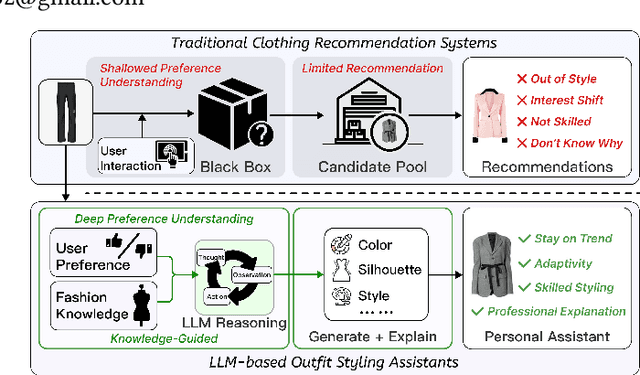Yuxi Bi
Synergizing RAG and Reasoning: A Systematic Review
Apr 22, 2025



Abstract:Recent breakthroughs in large language models (LLMs), particularly in reasoning capabilities, have propelled Retrieval-Augmented Generation (RAG) to unprecedented levels. By synergizing retrieval mechanisms with advanced reasoning, LLMs can now tackle increasingly complex problems. This paper presents a systematic review of the collaborative interplay between RAG and reasoning, clearly defining "reasoning" within the RAG context. It construct a comprehensive taxonomy encompassing multi-dimensional collaborative objectives, representative paradigms, and technical implementations, and analyze the bidirectional synergy methods. Additionally, we critically evaluate current limitations in RAG assessment, including the absence of intermediate supervision for multi-step reasoning and practical challenges related to cost-risk trade-offs. To bridge theory and practice, we provide practical guidelines tailored to diverse real-world applications. Finally, we identify promising research directions, such as graph-based knowledge integration, hybrid model collaboration, and RL-driven optimization. Overall, this work presents a theoretical framework and practical foundation to advance RAG systems in academia and industry, fostering the next generation of RAG solutions.
StePO-Rec: Towards Personalized Outfit Styling Assistant via Knowledge-Guided Multi-Step Reasoning
Apr 14, 2025



Abstract:Advancements in Generative AI offers new opportunities for FashionAI, surpassing traditional recommendation systems that often lack transparency and struggle to integrate expert knowledge, leaving the potential for personalized fashion styling remain untapped. To address these challenges, we present PAFA (Principle-Aware Fashion), a multi-granular knowledge base that organizes professional styling expertise into three levels of metadata, domain principles, and semantic relationships. Using PAFA, we develop StePO-Rec, a knowledge-guided method for multi-step outfit recommendation. StePO-Rec provides structured suggestions using a scenario-dimension-attribute framework, employing recursive tree construction to align recommendations with both professional principles and individual preferences. A preference-trend re-ranking system further adapts to fashion trends while maintaining the consistency of the user's original style. Experiments on the widely used personalized outfit dataset IQON show a 28% increase in Recall@1 and 32.8% in MAP. Furthermore, case studies highlight improved explainability, traceability, result reliability, and the seamless integration of expertise and personalization.
Retrieval-Augmented Generation for Large Language Models: A Survey
Jan 03, 2024



Abstract:Large Language Models (LLMs) demonstrate significant capabilities but face challenges such as hallucination, outdated knowledge, and non-transparent, untraceable reasoning processes. Retrieval-Augmented Generation (RAG) has emerged as a promising solution by incorporating knowledge from external databases. This enhances the accuracy and credibility of the models, particularly for knowledge-intensive tasks, and allows for continuous knowledge updates and integration of domain-specific information. RAG synergistically merges LLMs' intrinsic knowledge with the vast, dynamic repositories of external databases. This comprehensive review paper offers a detailed examination of the progression of RAG paradigms, encompassing the Naive RAG, the Advanced RAG, and the Modular RAG. It meticulously scrutinizes the tripartite foundation of RAG frameworks, which includes the retrieval , the generation and the augmentation techniques. The paper highlights the state-of-the-art technologies embedded in each of these critical components, providing a profound understanding of the advancements in RAG systems. Furthermore, this paper introduces the metrics and benchmarks for assessing RAG models, along with the most up-to-date evaluation framework. In conclusion, the paper delineates prospective avenues for research, including the identification of challenges, the expansion of multi-modalities, and the progression of the RAG infrastructure and its ecosystem.
 Add to Chrome
Add to Chrome Add to Firefox
Add to Firefox Add to Edge
Add to Edge